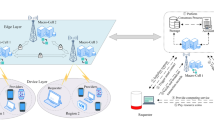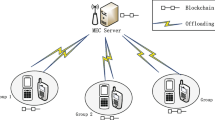Abstract
With the rapid growth of smart mobile devices, the limited resources and computing performance of mobile devices might increase the delay of processing tasks, resulting in greater energy and cost consumption by terminal devices. This study aimed to focus on the balance of delay and energy consumption in the mobile edge environment, considering the impact of computationally intensive network interference on system performance under blockchain and proposed a joint optimization algorithm for computing offloading and resource allocation of adaptive data block size in the edge environment. First, a computing offloading model and a communication model were established, and the problem model was optimized on that basis. Second, the incentive mechanism of a virtual currency based on blockchain was introduced, and a coordinate descent method was used to formulate the offloading decision of adaptive data block size. Then, a subchannel allocation was based on the improved Hungarian algorithm and the greedy algorithm while satisfying the user delay constraint. Finally, energy minimization problems were converted into power minimization problems, then into a convex optimization problem, and finally into the user’s optimal transmit power. Experimental results showed that compared with similar computing offloading algorithms, the proposed offloading decision could reduce the energy consumption of the system while satisfying different time delay requirements of the users and improving the system performance.








Similar content being viewed by others
REFERENCES
Abbas, N., Zhang, Y., Taherkordi, A., and Skeie, T., Mobile edge computing: A survey, IEEE Internet Things J., 2017, vol. 5, no. 1, pp. 450–465. https://doi.org/10.1109/JIOT.2017.2750180
Taleb, T., Samdanis, K., Mada, B., Flinck, H., Dutta, S., and Sabella, D. On multi-access edge computing: A survey of the emerging 5G network edge cloud architecture and orchestration, IEEE Commun. Surv. Tutorials, 2017, vol. 19, no. 3, pp. 1657–1681. https://doi.org/10.1109/COMST.2017.2705720
Hu, Y.C., Patel, M., Sabella, D., Sprecher, N., and Young, V., Mobile edge computing: A key technology towards 5G, ETSI White Paper, 2015, no. 11.
Mach, P. and Becvar, Z., Mobile edge computing: A survey on architecture and computation offloading, IEEE Commun. Surv. Tutorials, 2017, vol. 19, no. 3, pp. 1628–1656. https://doi.org/10.1109/COMST.2017.2682318
Yu, Yu., Lian, X., Zhu, Yu., et al., Resource allocation optimization research for augmentedreality applications based on mobile edge computation, J. Comput. Appl., vol. 39, no. 1, pp. 28–31.
Xiong, Z., Zhang, Y., Niyato, D., Wang, P., and Han, Zh., When mobile blockchain meets edge computing, IEEE Commun. Mag., 2018, vol. 56, no. 8, pp. 33–39. https://doi.org/10.1109/MCOM.2018.1701095
Chen, X., Jiao, L., Li, W., and Fu, X., Efficient multi-user computation offloading for mobile-edge cloud computing, IEEE/ACM Trans. Networking, 2015, vol. 24, no. 5, pp. 2795–2808. https://doi.org/10.1109/TNET.2015.2487344
Chen, M.H., Dong, M., and Liang, B., Joint offloading decision and resource allocation for mobile cloud with computing access point, 2016 IEEE Int. Conf. on Acoustics, Speech and Signal Processing (ICASSP), Shanghai, 2016, IEEE, 2016, pp. 3516–3520. https://doi.org/10.1109/ICASSP.2016.7472331
Shi, W., Zhang, J., Zhang, R., and Hu, K., An area-based offloading policy for computing offloading in MEC-assisted wireless mesh network, 2019 IEEE/CIC Int. Conf. on Communications in China (ICCC), Changchun, China, 2019, IEEE, 2019, pp. 507–511. https://doi.org/10.1109/ICCChina.2019.8855931
Yi, C., Cai, J., and Su, Z., A multi-user mobile computation offloading and transmission scheduling mechanism for delay-sensitive applications, IEEE Trans. Mobile Comput., 2019, vol. 19, no. 1, pp. 29–43. https://doi.org/10.1109/TMC.2019.2891736
Mao, Y., Zhang, J., and Letaief, K.B., Dynamic computation offloading for mobile-edge computing with energy harvesting devices, IEEE J. Sel. Areas Commun., 2016, vol. 34, no. 12, pp. 3590–3605. https://doi.org/10.1109/JSAC.2016.2611964
Tefera, G., She, K., Chen, M., and Ahmed, A., Congestion-aware adaptive decentralized computation offloading and caching for multi-access edge computing networks, IET Commun., 2020, vol. 14, no. 19, pp. 3410–3419. https://doi.org/10.1049/iet-com.2020.0630
Tian, B., Wang, L., Ai, Y., and Fei, A., Reinforcement learning based matching for computation offloading in D2D communications, 2019 IEEE/CIC Int. Conf. on Communications in Chine (ICCC), Changchun, China, 2019, IEEE, 2019, pp. 984–988. https://doi.org/10.1109/ICCChina.2019.8855817
Zhang, L., Fu, Di, Liu, J., Ngai, E.Ch.-H., and Zhu, W., On energy-efficient offloading in mobile cloud for real-time video applications, IEEE Trans. Circuits Syst. Video Technol., 2016, vol. 27, no. 1, pp. 170–181. https://doi.org/10.1109/TCSVT.2016.2539690
Yan, J., Bi, S., Zhang, Y.J., and Tao, M., Optimal task offloading and resource allocation in mobile-edge computing with inter-user task dependency, IEEE Trans. Wireless Commun., 2019, vol. 19, no. 1, pp. 235–250. https://doi.org/10.1109/TWC.2019.2943563
Chen, M.H., Dong, M., and Liang, B., Joint offloading decision and resource allocation for mobile cloud with computing access point, 2016 IEEE Int. Conf. on Acoustics, Speech and Signal Processing (ICASSP), Shanghai, 2016, IEEE, 2016, pp. 3516–3520. https://doi.org/10.1109/ICASSP.2016.7472331
Jia, G., Han, G., Du, J., and Chan, S., A maximum cache value policy in hybrid memory-based edge computing for mobile devices, IEEE Internet Things J., 2019, vol. 6, no. 3, pp. 4401–4410. https://doi.org/10.1109/JIOT.2018.2878872
Zhang, K., Mao, Y., Leng, S., Maharjan, S., and Zhang, Ya., Optimal delay constrained offloading for vehicular edge computing networks, 2017 IEEE Int. Conf. on Communications (ICC), Paris, 2017, IEEE, 2017, pp. 1–6. https://doi.org/10.1109/ICC.2017.7997360
Oueis, J., Strinati, E.C., and Barbarossa, S., Small cell clustering for efficient distributed cloud computing, IEEE 25th Annu. Int. Symp. on Personal, Indoor, and Mobile Radio Communication, Washington, D.C., 2014, IEEE, 2014, pp. 1474–1479. https://doi.org/10.1109/PIMRC.2014.7136401
Wang, C., Yu, F.R., Liang, C., Chen, Q., and Tang, L., Joint computation offloading and Interference management in wireless cellular networks with mobile edge computing, IEEE Trans. Veh. Technol., 2017, vol. 66, no. 8, pp. 7432–7445. https://doi.org/10.1109/TVT.2017.2672701
Boyd, L. and Vandenberghe, L., Convex Optimization, Cambridge: Cambridge Univ. Press, 2004.
Boyd, S., Parikh, N., Chu, E., Peleato, B., and Eckstein, J., Distributed optimization and statistical learning via the alternating direction method of multipliers, Found. Trends Mach. Learn., 2010, vol. 3, no. 1, pp. 1–122. https://doi.org/10.1561/2200000016
Jabeen, S. and Ho, P.-H., A benchmark for joint channel allocation and user scheduling in flexible heterogeneous networks, IEEE Trans. Veh. Technol., 2019, vol. 68, no. 9, pp. 9233–9244. https://doi.org/10.1109/TVT.2019.2930884
ACKNOWLEDGMENTS
The authors thank the editor and the anonymous reviewers for their helpful comments and suggestions.
Funding
The work was supported by the National Natural Science Foundation (NSF) under grants (no. 61802353), Henan Provincial Department of Science and Technology (no. 192102210270), and Dr Fund of Zhengzhou University of Light Industry.
Author information
Authors and Affiliations
Corresponding author
Ethics declarations
The authors declare that they have no conflicts of interest.
About this article
Cite this article
Yanpei Liu, Zhu, Q., Chen, N. et al. Computing Offloading and Resource Optimization of Adaptive Data Block Size in Edge Environments. Aut. Control Comp. Sci. 56, 564–576 (2022). https://doi.org/10.3103/S0146411622060104
Received:
Revised:
Accepted:
Published:
Issue Date:
DOI: https://doi.org/10.3103/S0146411622060104




